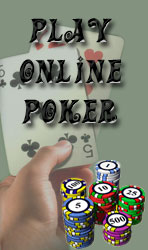Pokerwiner.com → Lessons of poker
Example 2
Suppose there is $80 in the pot, and you have two pair. You are playing draw poker, and you bet $10, which we will assume is all you can bet.
Your single opponent has a four-flush that is, four cards to a flush. The question is are you rooting for him to call or fold? Naturally you want him to do what is most profitable for you.
The Fundamental Theorem of Poker states that what is most profitable for you is for your opponent to make the incorrect play based on complete information about both hands.
Since your opponent is getting 9-to-1 odds (his $10 call might win him $90) and is only about a 5-to-1 underdog to make a flush, it is correct for him to call because a call has positive expectation.
Since it is correct for him to call, following the Fundamental Theorem, you are therefore rooting for him to fold.
This sort of situation comes up frequently. You have the best hand, but your opponent is getting odds good enough to make it correct to call if he knew what you had.
Therefore, you want your opponent to fold. By the same token, it is correct for you to chase when you are getting sufficient pot odds. If you don’t chase, you are therefore rooting for him to fold.
Example 3
Since it is correct for your opponent to call when he is getting sufficient pot odds, you can sometimes make an opponent fold incorrectly by showing more strength than you actually have on an early betting round. Suppose in seven card stud you bet with:




An opponent calls with:




You are fairly sure he has kings. You now proceed to make a pair of 6s on board, and you bet. Your opponent will almost certainly fold a pair of kings since he is afraid you have made made aces up.
Some people might say, “Well, wait a second. Why don’t I want my opponent to call as long as his pair of kings is worse than my two small pair?” The answer is that if there are cards to come and your opponent is getting proper odds, you do better to win the pot right there.
A pair of kings versus two smaller pair need very short odds to justify a call. Since your opponent would have been correct to call, you gain when you make him fold.
Example 4
In razz, a seven card stud lowball game in which the lowest hand wins, we can see another example of showing more strength than you have to make an opponent fold incorrectly. Let’s say your opponent has





showing and you have something like





If you think your opponent has a four-card 8 – and you have a pair and only a four-card 8-7 – it is important to bet, even though you know you will be called. The bet gains you some extra equity, should you happen to catch a little card on sixth poker street, giving you an 8-7 low.
If your opponent catches a big card or a pair, still having a draw to a better 8 than yours, he will fold, since your previous bet indicated you had an 8 made already.
The little card you’ve now caught suggests you have made a 7 low, which makes your opponent think he is drawing dead that is, drawing with no chance of winning.
Notice that once again you want your opponent to fold even though you have the best hand. You have an 8,7 low and are drawing to a 7, while all your opponent has is a draw to a better 8.
However, you gain by his folding because, had he known you had only an 8, 7, he would be getting proper odds to call in the hope of drawing out on you. By not calling he made a mistake, and you have gained. ( You gain even more when that sixth card makes you two pair, and your opponent folds the best hand.)



